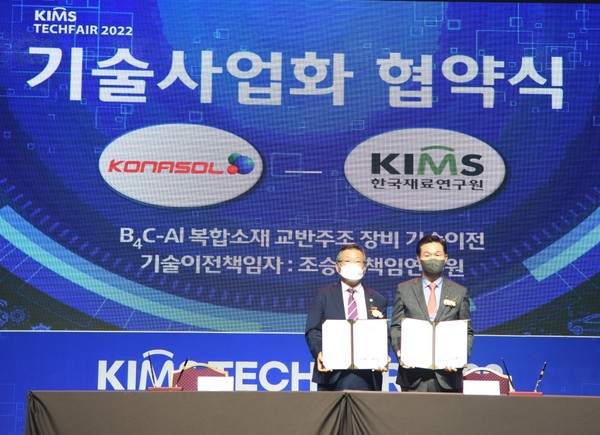KIMS Signs a technology commercialization agreement with Konasol
The Korea Institute of Materials Science (KIMS), a government-funded research institute under the Ministry of Science and ICT, has partnered with Konasol Co., Ltd. (CEO Kang Yun-geun), a metal composite material company, to commercialize the material for the transport/storage container of spent nuclear fuel. KIMS signed a technology commercialization agreement with Konasol. at the opening ceremony of the 'KIMS TECHFAIR 2022' exhibition held at the Changwon Convention Center on Sept. 21 to promise future technical cooperation.

The temporary storage facility for spent nuclear fuel in Korea is expected to gradually become saturated from the Kori nuclear power plant in 2028, and the development of a dual purpose cask (DPC) that can transport and store spent nuclear fuel is currently underway. The neutron-absorbing material used for this container is entirely imported from foreign material companies such as the United States and Japan, and so it is important to localize the neutron-absorbing aluminum composite material technology and develop the original technology that can secure the efficiency and safety of transportation/storage.
KIMS has succeeded in manufacturing a low-cost casting-based neutron-absorbing aluminum composite sheet up to 2m in length through self-developed equipment and process analysis. Based on this technology, Konasol plans to produce actual products up to 5m in size by building mass production facilities.
President Lee Jung-hwan of the Material Research Institute said, “Through the development of metal composite agitation casting process technology, it is meaningful in that it has manufactured a metal composite material that is inexpensive and has excellent properties compared to the existing powder metallurgy. We will do our best to ensure that the core materials that safely store and move spent nuclear fuel, which are high-level radioactive waste, can be localized as soon as possible.”

